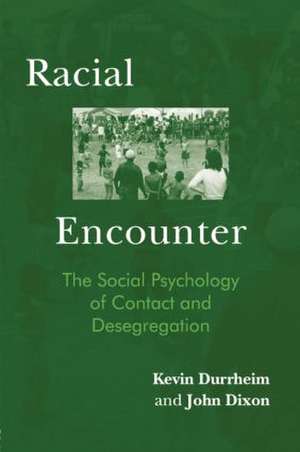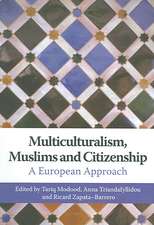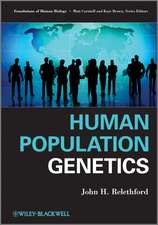Racial Encounter: The Social Psychology of Contact and Desegregation
Autor Kevin Durrheim, John Dixonen Limba Engleză Paperback – 23 dec 2014
By examining these emerging processes of intergroup contact in South Africa, and evaluating related evidence from the US, Racial Encounter offers a social psychological account of desegregation. It begins with a critical analysis of the traditional theories and research models used to understand desegregation: the contact hypothesis and race attitude theory. It then analyzes every day discourse about desegregation in South Africa, showing how discourse shapes individuals' conception and management of their changing relationships and acts as a site of ideological resistance to social change. The connection between place, identity and re-creation of racial boundaries emerge as a central theme of this analysis.
This book will be of interest to social psychologists, students of intergroup relations and all those interested in post-apartheid South Africa.
| Toate formatele și edițiile | Preț | Express |
|---|---|---|
| Paperback (1) | 466.45 lei 6-8 săpt. | |
| Taylor & Francis – 23 dec 2014 | 466.45 lei 6-8 săpt. | |
| Hardback (1) | 1007.48 lei 6-8 săpt. | |
| Taylor & Francis – 27 oct 2005 | 1007.48 lei 6-8 săpt. |
Preț: 466.45 lei
Nou
Puncte Express: 700
Preț estimativ în valută:
89.28€ • 97.01$ • 75.05£
89.28€ • 97.01$ • 75.05£
Carte tipărită la comandă
Livrare economică 21 aprilie-05 mai
Preluare comenzi: 021 569.72.76
Specificații
ISBN-13: 9781138876897
ISBN-10: 1138876895
Pagini: 272
Dimensiuni: 156 x 234 x 14 mm
Greutate: 0.39 kg
Ediția:1
Editura: Taylor & Francis
Colecția Routledge
Locul publicării:Oxford, United Kingdom
ISBN-10: 1138876895
Pagini: 272
Dimensiuni: 156 x 234 x 14 mm
Greutate: 0.39 kg
Ediția:1
Editura: Taylor & Francis
Colecția Routledge
Locul publicării:Oxford, United Kingdom
Cuprins
Introduction. Part I. The Contact Hypothesis Reconsidered. The Contact Hypothesis as a Framework for Understanding the Social Psychology of Desegregation. Contact and the ‘Ecology’ of Everyday Relations. ‘You Have to be Scared when they’re in their Masses’: Working Models of Contact in Ordinary Accounts of Interaction and Avoidance. Part II: Attitudes to Desegregation Reconsidered. Attitudes Towards Desegregation as a Framework for Understanding the Social Psychology of Desegregation. Evaluative Practices: A Discursive Approach to Investigating Desegregation Attitudes. Lay Ontologizing: Everyday Explanations of Segregation and Desegregation. Group Differences in Narrating the ‘Lived Experience’ of Desegregation. Part II: ‘Locating’ the Social Psychology of Contact and Desegregation. Dislocating Identity: Desegregation and the Transformation of Place. Conclusions: ‘Racial Preferences’ and the Tenacity of Segregation.
Notă biografică
Kevin Durrheim is Professor in the School of Psychology at the University of KwaZulu-Natal, South Africa
John Dixon is Senior Lecturer in Social Psychology at the University of Lancaster
John Dixon is Senior Lecturer in Social Psychology at the University of Lancaster
Recenzii
"This is a marvellous book. It is sharp, clear, bright-minded and deals with a very important issue for group relations in general: the psychology of segregation and desegregation. It is a major contribution to our new era (post 1990) understanding of contact and group relations in deeply divided societies." - Don Foster, PINS - Vol. 42, 2011
'This is an excellent book. It is a joy to read on a number of levels. It is clear, thoughtful and weaves its way through the different literatures of racism and segregation in a subtle but surefooted manner. The breadth of the authors' scholarship shows through, as does the value of their use of a case study to focus everything around.' - Jonathan Potter, Professor of Discourse Analysis in the Department of Social Sciences, Loughborough University
"This is a marvellous book. It is sharp, clear, bright-minded and deals with a very important issue for group relations in general: the psychology of segregation and desegregation. It is a major contribution to our new era (post 1990) understanding of contact and group relations in deeply divided societies." - Don Foster, PINS - Vol. 42, 2011
'This is an excellent book. It is a joy to read on a number of levels. It is clear, thoughtful and weaves its way through the different literatures of racism and segregation in a subtle but surefooted manner. The breadth of the authors' scholarship shows through, as does the value of their use of a case study to focus everything around.' - Jonathan Potter, Professor of Discourse Analysis in the Department of Social Sciences, Loughborough University
"This is a marvellous book. It is sharp, clear, bright-minded and deals with a very important issue for group relations in general: the psychology of segregation and desegregation. It is a major contribution to our new era (post 1990) understanding of contact and group relations in deeply divided societies." - Don Foster, PINS - Vol. 42, 2011
Descriere
By examining the processes of intergroup contact which arose in South Africa following the removal of official ethnic divides, and supporting it with evidence from the US, Racial Encounter offers a social psychological account of desegregation.














